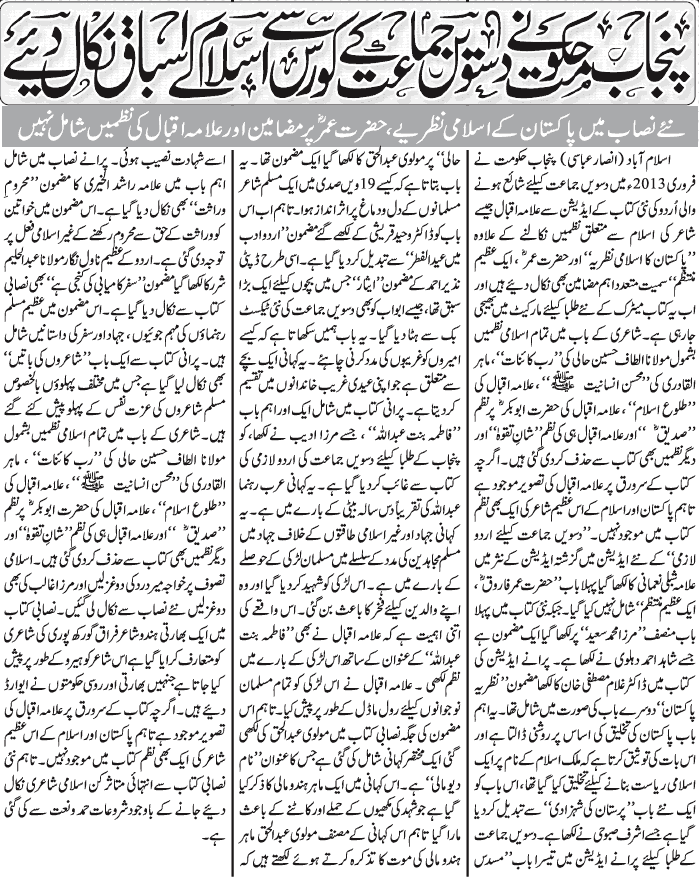These subjects include ‘Islamic ideology of Pakistan’ and ‘Hazrat Umar (RA)- a Great Administrator’ besides removing persuasive Islam-related poems of even poets like Allama Iqbal. On the poetry side, all the Islamic poems including ‘Rabbe Kainaat’ of Maulana Altaf Hussain Hali, ‘Mohsin-e-Insaniat (PBUH)’ (the Saviour of Humanity) by Mahirul Qadri, ‘Tulu-e-Islam’ (the rise of Islam) of Allama Iqbal, ‘Siddiq (RA)’ on Hazrat Abu Bakar Siddiq (RA) by Allama Iqbal, ‘Shaan-e-Taqwa’ (which is against drinking) by Allama Iqbal etc have also been removed in the new text book.
While the title page of the book contains the picture of Allama Iqbal, it does not contain any poem of the great poet of Islam and Pakistan.
The new edition of the ‘Urdu compulsory for 10th class’ does not include the very first chapter of the earlier edition’s prose i.e ‘Hazrat Umar Farooq (RA)- a great administrator’ by Allama Shibli Naumani. The new text book’s first chapter is an essay on writer ‘Mirza Muhammad Saeed’ written by Shahid Ahmad Dehlvi.
The second chapter in the old edition was on ‘Ideology of Pakistan’ written by Dr Ghulam Mustafa Khan. This important chapter highlighted the basis for the creation of Pakistan and endorsed that the country was created in the name of Islam, to make it an Islamic state, has been replaced by a new chapter on ‘Princess of Paristan’ (Paristan ki shahzadi) written by Ashraf Saboohi.
The third chapter of the old edition of the 10th class text book was ‘Musaddas-e-Hali’ written by Moulvi Abdul Haq. This chapter narrates how a Muslim poet in the 19th century influenced the hearts and minds of the Muslims. It has now been replaced by a writing of Dr Waheed Qureshi on ‘Eidul Fitr in Urdu Literature’ (Urdu Adab main Eidul Fitr).
Similarly the chapters like ‘Sacrifice’ (Eisaar) by Deputy Nazir Ahmad, which has a great lesson for children, has been removed from the new 10th class text book. This chapter gives the lesson of how the affluent should help the poor. The story is about a child, who distributed his Eidi to a poor family.
Another important chapter of the old book ‘Fatima binte (daughter of) Abdullah’ written by Mirza Adeeb has also disappeared from the new Urdu compulsory of class 10 for Punjab students. This story was about a 10-year old daughter of an Arab leader Abdullah. The story is about Jihad and the young Muslim girl’s urge to help the Muslim Mujahideen in Jihad against un-Islamic forces. The girl was martyred and did her parents proud.
This incident has such an importance that even Allama Muhammad Iqbal had also written a poem on this young girl with the title ‘Fatima binte Abdullah’. Allama presented her as a role model for Muslim youth.
A chapter Nam Dev Mali was, instead, included in the book that was about an expert Hindu gardener who was killed when attacked and stung by honey bees. The writer of this short story Maulvi Abdul Haq described the death of the expert Hindu gardener as ‘having embraced Shahadat (martyrdom)’.
One of the chapters in the old edition was about ‘The deprived of inheritance’ (Mahroom-e-Virasat) by Allama Rashidul Khairi has also been excluded. This chapter focused on the un-Islamic tradition of depriving women of inheritance.
One chapter called ‘Travelling is the key to success’ (Safar Kamiabi ki Kunji hay) written by Moulana Abdul Haleem Sharar, a great Urdu writer, has also been removed. It covered the adventures, jihad, travelling etc of the great Muslim leaders.
A chapter on the ‘words of poets’ (Shaeron ki batain) in the old book has also been removed.
The chapter presented different aspects particularly self respect of Muslim poets.
On the poetry side all the Islamic poems including ‘Rabe Kainaat’ of Maulana Altaf Hussain Hali, Tulu-e-Islam of Allama Iqbal, ‘Mohsin-e-Insaniat’ of Mahirul Qadri, ‘Siddiq (RA) on Hazrat Abu Bakar Siddiq (RA) by Allama Iqbal, ‘Shaan-e-Taqwa’ (which is against drinking) by Allama Iqbal etc have also been removed in the new text book.
Two ghazals of Khawaja Mir Dard on Islamic Sufism and two ghazals of Mirza Ghalib have also been removed from the new text. Poetry of a Indian poet Firaq Gorakhpuri has been included in the text book and the poet is presented as a hero awarded by the Indian and Russian governments.
While the title page of the book contains the picture of Allama Iqbal, it does not contain any poem of the great poet of Islam and Pakistan. Excluding extremely impressive Islamic poetry, the new text book, however starts with a Hamd (praise of Almighty Allah) and Naat (praise of Hazrat Muhammad — PBUH).






.webp)




